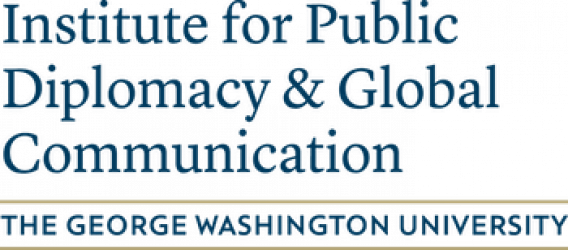That was the message at the panel talk arranged by the Institute for Public Diplomacy and Global Communication (IPDGC) with the Elliott School’s Graduate Student Services (GSS) last Thursday, February 7.
The very experienced panel of public diplomacy practitioners shared personal experiences about opportunities and career paths, and the impact of PD work.
In welcoming the panel, Elliott School’s senior career coach Tara Sonenshine spoke about her own experience when she was U.S. Undersecretary for Public Diplomacy at the State Department. Person-to-person communication was so critical to establishing that connection, she shared.
The panel comprised of Susan Crystal, Deputy Assistant Secretary (DAS), U.S. State Department; Monica Enqvist, Head of Public Diplomacy and Press, Embassy of Sweden; Holger Mahnicke, Head of Communication, Embassy of the Federal Republic of Germany; and Roger-Mark deSouza, President and CEO of Sister Cities International.

DAS Susan Crystal talked about how the State Department welcomed everyone who was interested in a U.S Foreign Service career. She explained that with five career tracks, there were options for those with different talents; it was not a “one size fits all” career.
Two senior diplomats from Germany and Sweden both talked with pride about how they helped their respective countries communicate successfully with the rest of the world.

Monica Enqvist from the Embassy of Sweden recounted how every job change for her was a way to learn the different facets of communication and public diplomacy.
 Holger Mahnicke talked about his excitement at being in the field and working on solutions to crises during his posting in central Africa.
Holger Mahnicke talked about his excitement at being in the field and working on solutions to crises during his posting in central Africa.
Just as enthused about people-to-people exchanges, Roger-Mark deSouza described how he buil t on what he learned as a graduate student with three jobs, and then applied this knowledge to his different non-profit roles. He told the audience not to discount their experiences and always work to improve people skills as these would always serve them well.
t on what he learned as a graduate student with three jobs, and then applied this knowledge to his different non-profit roles. He told the audience not to discount their experiences and always work to improve people skills as these would always serve them well.
Related links:
U.S. State Department: https://www.state.gov/r/pa/ei/rls/dos/436.htm
Sister Cities International: https://sistercities.org
German Embassy in Washington, DC: https://www.germany.info/us-en
Embassy of Sweden: https://www.swedenabroad.se/en/embassies/usa-washington/







 Holger Mahnicke talked about his excitement at being in the field and working on solutions to crises during his posting in central Africa.
Holger Mahnicke talked about his excitement at being in the field and working on solutions to crises during his posting in central Africa. t on what he learned as a graduate student with three jobs, and then applied this knowledge to his different non-profit roles. He told the audience not to discount their experiences and always work to improve people skills as these would always serve them well.
t on what he learned as a graduate student with three jobs, and then applied this knowledge to his different non-profit roles. He told the audience not to discount their experiences and always work to improve people skills as these would always serve them well.